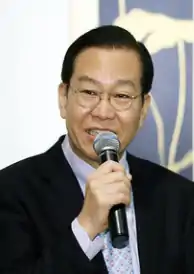Kwon Young-se
Kwon Young-se (Korean: 권영세; Hanja: 權寧世; born 24 February 1959) is a South Korean politician and diplomat who is currently serving as the member for Yongsan in the National Assembly. A member of the People Power Party, he is often described as a moderate conservative within his party.[1] He previously served in the National Assembly as the member for Yeongdeungpo B from 2002 to 2012.[2]
Kwon Young-se | |
|---|---|
| 권영세 | |
 Kwon in 2014 | |
| Minister of Unification | |
| In office 16 May 2022 – 28 July 2023 | |
| President | Yoon Suk-yeol |
| Prime Minister | Han Duck-soo |
| Preceded by | Lee In-young |
| Succeeded by | Kim Yung-ho |
| Member of the National Assembly | |
| Assumed office 30 May 2020 | |
| Preceded by | Chin Young |
| Constituency | Yongsan |
| In office 8 August 2002 – 29 May 2012 | |
| Preceded by | Kim Min-seok |
| Succeeded by | Shin Kyoung-min |
| Constituency | Yeongdeungpo B |
| South Korean Ambassador to China | |
| In office 1 June 2013 – 26 March 2015 | |
| President | Park Geun-hye |
| Preceded by | Lee Kyu-hyung |
| Succeeded by | Kim Jang-soo |
| Personal details | |
| Born | 24 February 1959 Seoul, South Korea |
| Political party | People Power Party |
| Alma mater | Seoul National University (LLB, LLM) Harvard University (MPA) |
| Military service | |
| Allegiance | |
| Branch/service | Republic of Korea Air Force |
| Years of service | 1986–1989 |
| Rank | Captain (Korean: Daewi) |
| Unit | Military advocate |
Early life
Kwon Yeong-se was born on February 24, 1959, into a working-class family in Seoul. He graduated from the Seoul National University School of Law and passed his bar examination in 1983. He later received his MPA from the Harvard Kennedy School.
Career
Prior to becoming a politician, Kwon worked as a public prosecutor. He entered politics when he was nominated as the Grand National Party's candidate for Yeongdeungpo B in the 2002 South Korean by-elections after former member Kim Min-seok's resignation in order to run in the Seoul Mayoral election. Kwon was elected with 54.9% of the vote in the election.[3] He was re-elected in his constituency in the 2004 election and the 2008 election, but failed to be re-elected in the 2012 election.[4]
While not a member of the National Assembly, he actively supported Park Geun-hye's campaign in the 2012 South Korean presidential election. He was then appointed by President Park Geun-hye to serve as South Korea's Ambassador to China in early 2013. He returned to South Korea in March 2015 and was succeeded by Kim Jang-soo.[5]
Upon his return to South Korea, he once again ran as the Saenuri Party's candidate for the Yeongdeungpo B constituency in the 2016 South Korean legislative election, however he was defeated by incumbent Shin Kyoung-min.[6]
In the 2020 South Korean legislative election, Kwon narrowly defeated Democratic candidate Kang Tae-woong in the Yongsan constituency race, returning to the National Assembly as a member after eight years.[7]
References
- "권영세 "중도 잡겠다" vs 주호영 "보수 재건"… 통합당 원내대표 '막판 호소'". 뉴데일리. 7 May 2020. Retrieved 2021-04-11.
- "[총선 격전지를 가다] ② 영등포 을". 매일경제 (in Korean). 2016-01-20. Retrieved 2021-04-09.
- "8·8 재보선 당선자 : 정치 :인터넷한겨레 The Hankyoreh". legacy.www.hani.co.kr. Retrieved 2021-04-09.
- "[약속 2012 4·11총선 이후]여 사무총장의 저주… 서울 영등포을 낙선 권영세". 13 April 2012.
- ""권영세 비서실장설, 주목해야 또 안 당한다" - 고발뉴스닷컴". www.gobalnews.com. Retrieved 2021-04-11.
- "[격전지를 가다] 수성 vs 탈환 영등포을, 신경민-권영세 '초박빙'". 뉴스핌 (in Korean). Retrieved 2021-04-11.
- "[포토] 당선 소감 밝히는 권영세 통합당 용산구 후보". 뉴데일리. 16 April 2020. Retrieved 2021-04-11.